Shark fishing jars quiet oceanside south beaches neighborhood
There's blood in the water here along Brevard County's far southern beaches where shark fishermen and oceanfront owners increasingly battle over access to the shore and what some residents say is illegal activity among those with so many poles stuck in the sand.
Many of those fishing use multiple poles daily along this nestle of the Archie Carr National Wildlife Refuge, local residents say.
It's not the fishing, per se, that's the problem, residents say, as much as the rowdy behavior of those fishing and the way they go about it.
Residents say too many cars often pack onto and beyond the narrow public access to the beach, encroaching on surrounding conservation lands and bringing too many people to a spot with no bathroom or other facilities.
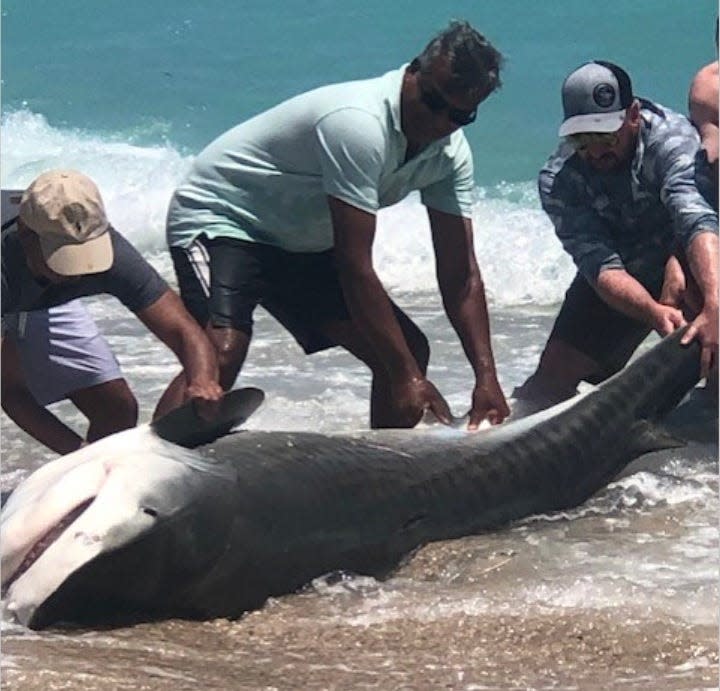
There have been some 300 calls to law enforcement over the past two years about loud partying at all hours, trespassing and burglaries of cars and homes. Those hoping to catch sharks sometimes toss bloody chum into the surf to lure the predators to the area.
Some of the fishermen have threatened retaliation over calls to law enforcement, residents say.
"You don't see anything but a sea of fishing poles," Dr. Neal Abarbanell said of the view outside his oceanside home. "We're scared and we need help from our government and our government turned its back on us. These guys don't return a phone call."
Abarbanell is so incensed about the issue that he is running for the open County Commission District 3 seat.
It's a common clash along Florida's beach sides. Families want to take their toddlers to play safely in the surf. Fishermen seek the adrenaline rush of reeling up sharks and other big fish in the same space.
Another large great white shark 'pings' off Brevard County

A public access and a neighborhood
The narrow sandy strip just south of Whitey's Bait and Tackle and north of Long Point Bait and Tackle has been a county public access to the beach since 1958. But tensions between residents and anglers amped up a few years ago, as more and more cars seemed to 'plow' the access space there ever-wider.
"It's one of the few accesses available for people," said Don Riordan, a clerk at Whitey's Bait and Tackle. He said he hasn't heard of shark chumming on the beach; that typically happens from boats. "We're not getting anybody who's buying any of that kind of stuff from us," Riordan said.
But he has heard of some rude fishermen "from the center of the state" fishing from that access. "There's no limit on the number of (fishing) poles being used (on the beach)," he said.
Steve Stewart, manager of Long Point Bait and Tackle, also said he doesn't specifically know of beach chumming but has heard of other ongoing conflicts: fishing poles blocking the beach to surfers and others for long distances on either side of the public access, and the chronic hostility.
"There's a large weekend group that come over from Orlando every weekend and fish for everything," Stewart said. He sells frozen blocks of fish chum but that's supposed to be used offshore. "I don't sell anything bloody," he said. But any other fish caught at the beach could be cut up for bloody chum, he added.
Maintaining public beach accesses is enshrined in the county's comprehensive plan, so access points can't be vacated or diminished without a public hearing and approval by supermajority of the County Commission.
An added wrinkle to the issue has been the county's ongoing efforts to fortify the sand dunes in the area, which have been damaged by hurricanes in recent years. But replenishment efforts hinge on property owners giving public access to the parts of the beach they own. Abarbanell and several others say they declined to sign such waivers.
Shark fishermen assert their rights on private property
Indian River Oaks oceanfront homeowners own the beach in front of their residences. But Florida law also guarantees access to beach below the mean high-water line.
Residents say they've coexisted peacefully with fishermen for years. No one's sure how or why things got so nasty. One resident said it seemed to get worse with every full moon over the past four years. Others say it was when other towns shut down their beaches during the COVID-19 pandemic and more out-of-town fishermen discovered this remote public access.
Some suspect it might have to do with the advent of higher fees and/or stricter enforcement of fishing and other rules at nearby parks such as Sebastian Inlet State Park, a half-mile away.
Abarbanell, who moved here in October, says that when he's asked the fishermen nicely to move down the beach to allow his wife and 2-year-old daughter to enjoy the beach they own in front of their home, the fishermen have been less than chummy, often telling him in a not-so-nice words, to go pound sand.
FLORIDA TODAY reached out to other residents who told similar stories but wouldn't go on record, for fear of retaliation from fishermen.
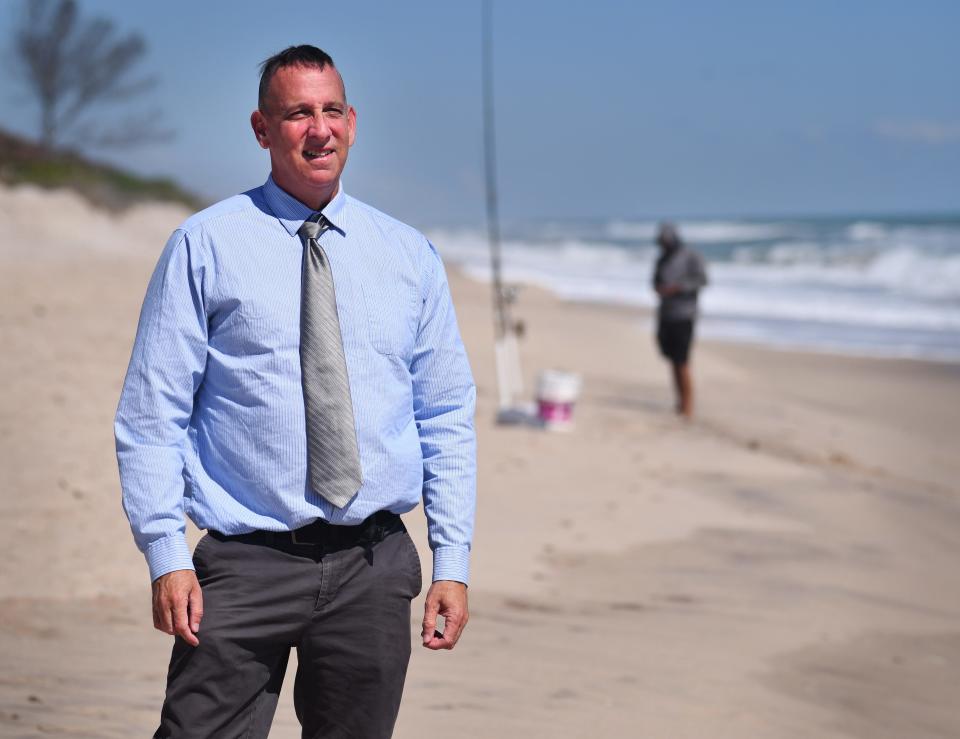
South beaches residents fear 'taking the bait'
The owners say they aren't being pompous or anti-fishing, as they sense the fishermen perceive, but that they're just petrified and paralyzed about how to restore peace to their once-quiet neighborhood.
The Abarbanells are already considering moving but not without a fight. That's why Neal Abarbanell say's he's running for County Commission.
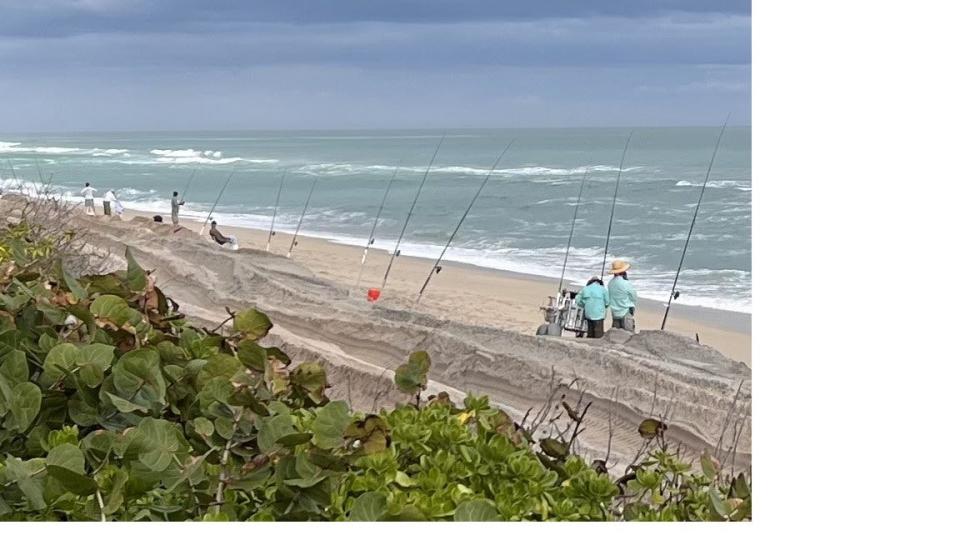
Indian River Oaks subdivision residents documented about 300 calls from their area made to Brevard County Sheriff's Office in the past two years. But response in their remote slice of paradise can take hours, they say, with deputies and state wildlife officers only giving warnings but not citations. Dogs roam the beach, unleashed, and Animal Services calls back days later, Abarbanell said.
Residents say sheriff's office representatives promised increased patrols when possible and that they'd cite people for trespassing after formal warnings. Abarbanell and others at Indian River Oaks say that never happened.
A sheriff's office official suggested closing the beach access altogether, residents say, because it's so remote, has poor lighting, difficult terrain, and the high frequency of calls to law enforcement. But other county officials said they can't legally block public access and also cited the state dune-replenishment money the access helps to obtain.
Abarbanell, a primary care physician, says he's seen fishermen dump chum from the beach and/or go about 20 to 30 feet out in a kayak and dump the chum near where children are in the water. He said he complained to the Florida Fish and Wildlife Conservation Commission about it, to no avail.
Only a few fishermen were around on a recent visit to the public access, and they declined comment for this story.
FLORIDA TODAY's inquiries by phone and email to the sheriff's office spokesman about the matter were not returned. FWC responded via email saying, "chumming is not permitted when fishing for any species from the beach or when wade fishing in waters adjacent to a beach. It is permitted elsewhere including from piers or from a vessel," the agency said, then referring to FWC's toll-free Wildlife Alert number to report violations.
Dune money at stake
The county refuses to close or limit the parking area in Indian River Oaks because public access is among the ways the state ranks which beaches it funds to build back. The federal government pays for most of the beach replenishment from Port Canaveral south to the Melbourne Beach area. But the 14.5 miles of south beaches stretch from Spessard Holland Park to Sebastian Inlet is Brevard County's responsibility.
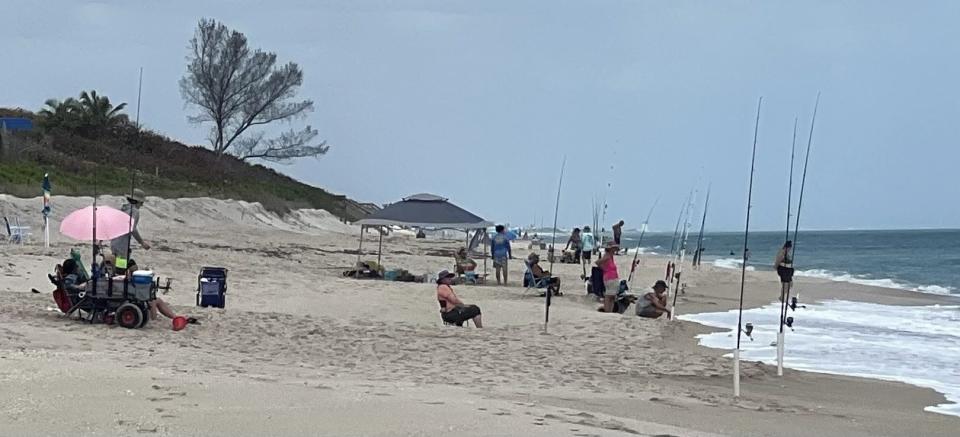
Beach repairs in the south beaches related to the 2022 storms (Hurricanes Ian and Nicole) were estimated at $22.5 million. That would have drained the county's beach-renourishment money and required another $6.4 million to be drawn from federal American Rescue Plan Act — COVID-19 stimulus plan — funds that Brevard received, county officials warned last year. Brevard officials expected the Federal Emergency Management Agency, in conjunction with the state, to reimburse the county for much of the storm damage to the south beaches but for that to take up to three years.
"Their zeal to get that money is more important to them than the safety and peace for an entire community," Abarbanell said. "They're going to sell out a whole neighborhood for a couple of dollars."
Abarbanell and some others in Indian River Oaks point to photos they've taken of cars parked beyond the 36-foot-wide easement as proof that too many park there and are damaging conservation lands.
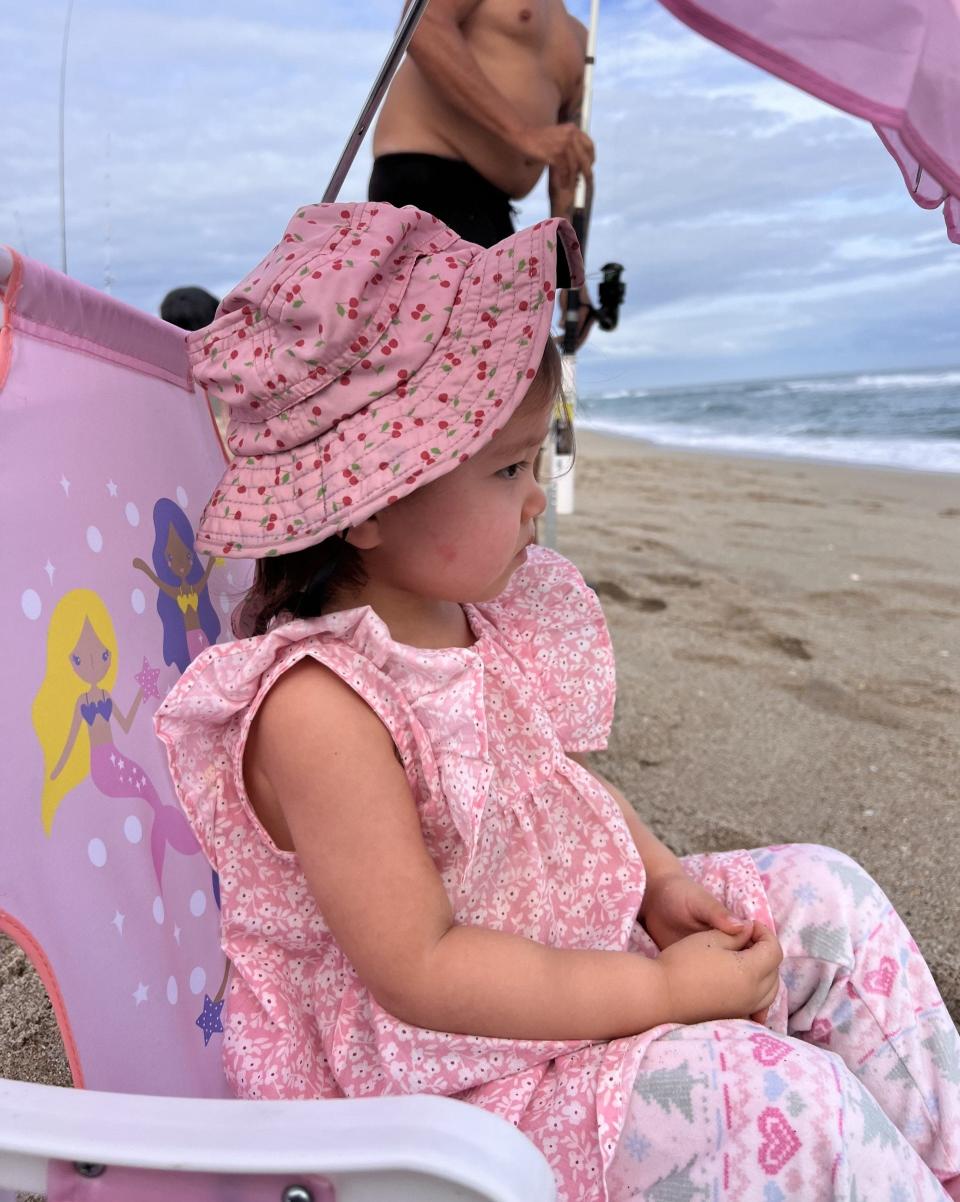
Residents say nearby parks — they cite nine of them — are losing out on about $50,000 per year, they estimate, from lost fees of those who fish in their neighborhood, instead.
Meanwhile, as parking fees and rules increase elsewhere, so does pressure on this narrow county easement, which now often gets in excess of 25 cars that at times roll onto surrounding conservation lands.
The wider the "lot" becomes, the larger the gulf of fury grows between the residents and fishermen over whose rights reign supreme.
In a March 7 email to an Indian River Oaks resident, Assistant Brevard County Manager John Denninghoff said that although the county's Comprehensive Land Use Plan protects such public beach access it also has ways to eliminate such assess with a majority plus-one vote by the Commission.
"Without Commission direction or without obvious public benefit, County staff will not initiate such a process," Denninghoff wrote. "The facility is not a Public Park but is a public dune crossover and access point. As such it has no designated or formal parking of any kind."
Parking on county right of way is allowed, however, he added, unless the Commission identifies reasons to prohibit it, such as damage to roadways and traffic safety hazards but that's " .. not applicable in this instance."
"In conclusion, county staff has attempted on multiple occasions to be responsive to concerns and questions relating to this beach access," Denninghoff wrote. "We do not anticipate any change in response or action by County staff."
Candidates for Brevard County Commission District 3:
Neal Abarbanell (REP)
Kim Adkinson (REP)
John A. Dittmore (REP)
Yvonne Elaine Minus (DEM)
To report shark chumming or other fishing, wildlife or boating violations, call FWC's wildlife alert hotline at 888-404-3922.
Contact Waymer at 321-242-3663 or jwaymer@floridatoday.com. Follow him on Twitter @JWayEnviro or www.facebook.com/jim.waymer
This article originally appeared on Florida Today: Shark fishing near families has led to bad blood on this Florida beach

